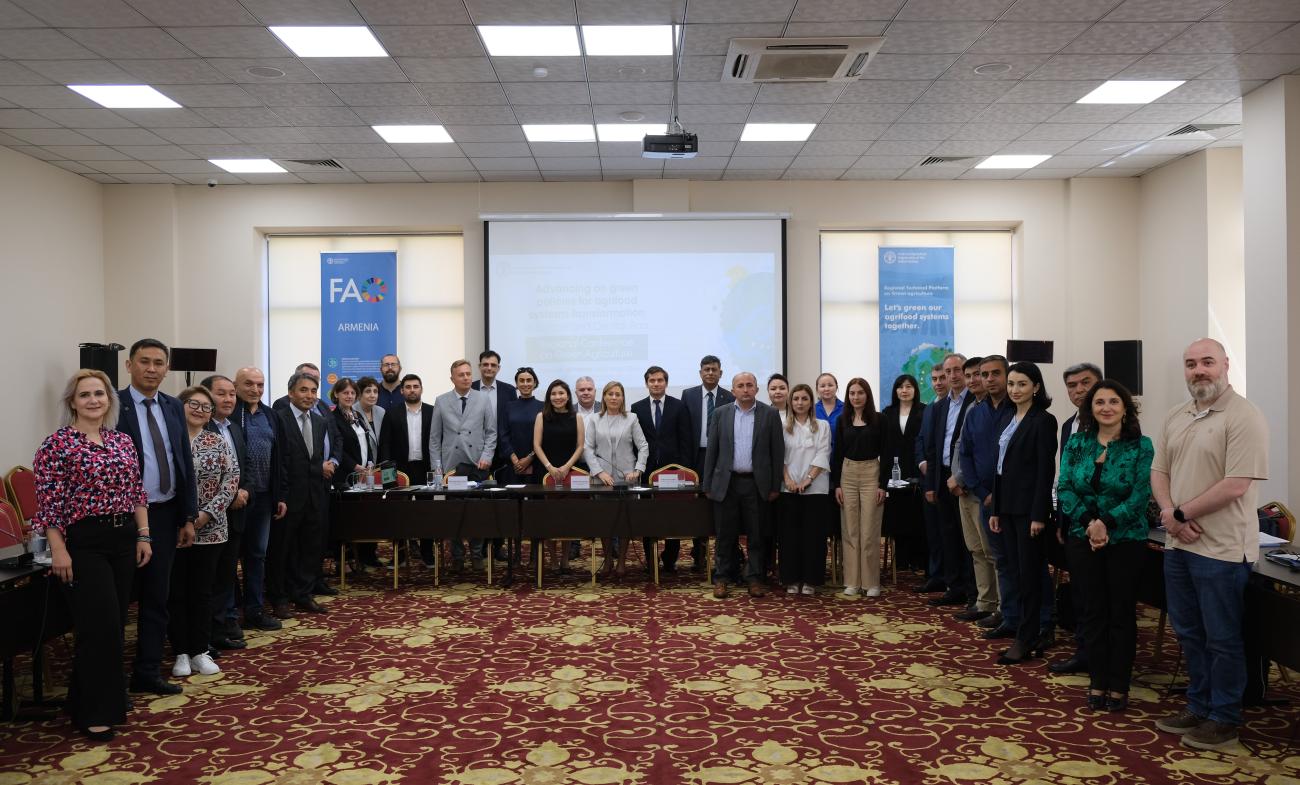In Armenia, regional conference shines light on green policies to transform agrifood systems

The Regional Conference on Green Agriculture was held from 29–31 May in Yerevan, Armenia.
Yerevan, Armenia – 11 June, 2024 – The impacts of COVID-19, the war in Ukraine and climate change continue to challenge the resilience and sustainability of agrifood systems in Armenia and throughout the region. Addressing these challenges will require the promotion of increased environmental sustainability and ecologically sound and socially responsible agriculture practices that consider economic dimensions.
The Regional Conference on Green Agriculture was held from 29–31 May in Yerevan, Armenia, with more than 50 participants in person and many more online. The event was opened by United Nations Resident Coordinator Francoise Jacob and by Raimund Jehle, Food and Agriculture Organization of the United Nations (FAO) Representative in Armenia.
The FAO event convened representatives from various sectors – including government, academia, civil society and the private sector – from Armenia, Georgia, Kazakhstan, Kyrgyzstan, Republic of Moldova and Uzbekistan. The aim of the conference was to exchange experiences and facilitate discussions regarding the status of green agriculture and green policies, with a focus on leveraging innovation and technology to advance the green transformation in agrifood systems, both regionally and globally.
The UN Resident Coordinator emphasized the importance of understanding the complexity of agrifood systems transformation, highlighting the pivotal role played by green agriculture, innovation and youth in addressing these challenges.
FAO Representative in Armenia, for his part, underscored the significant efforts and achievements in Armenia in implementing the country’s national pathway for agrifood systems transformation and the ongoing monitoring of progress.
“Armenia stands as a front runner in agrifood systems transformation,” said Raimund Jehle.
In a journey across the globe, the conference highlighted successful green agriculture practices from various regions. Highlights from Asia included the MIDORI strategy on sustainable food systems in Japan and the constitutional recognition of organic farming laws in the Philippines. The inter-regional platform on water scarcity in the Near East and North Africa and the Voluntary Guidelines on Agro-Environmental Policies from Latin America and the Caribbean also were highlighted.
These examples demonstrate the importance of raising awareness and sharing knowledge within and among regions on the role of policies to promote green agriculture, said Tania Santivanez, FAO Regional Coordinator for natural resources management, biodiversity and climate change.
To strengthen the connection between evidence-based information and the design of green policies in the region, the conference on its final day featured capacity-building workshops on science–policy interfaces. Participants discussed the development of a road map for actioning science–policy interfaces at the country level, with a focus on Armenia, Georgia, Kazakhstan, Republic of Moldova and Uzbekistan.
One of the main outcomes of the conference was the discussion of a master plan for green agriculture. This comprehensive plan of action serves as a compass to guide further strategic actions at the country level, aiming to develop national road maps for three pilot countries – Armenia, Kazakhstan and Uzbekistan – in line with FAO’s Strategic Framework and the four betters.
Progress in green agriculture
The agricultural sector in Armenia, which contributes 12 percent of the country’s gross domestic product and employs 25 percent of its workforce, is making significant strides in green practices to align with global environmental goals for food security and sustainability.
Key initiatives include state assistance for leasing agrifood equipment, supported by green finance initiatives such as the European Bank for Reconstruction and Development’s Green Economy Financing Facility and the European Union Green Agriculture Initiative in Armenia project on green agriculture. Despite such challenges as natural resource depletion and climate change, Armenia is progressing in adopting green practices, supported by the development of a national road map, and the establishment of a Regional Green Agriculture Network aimed at enhancing policy coherence and agrifood system resilience.




